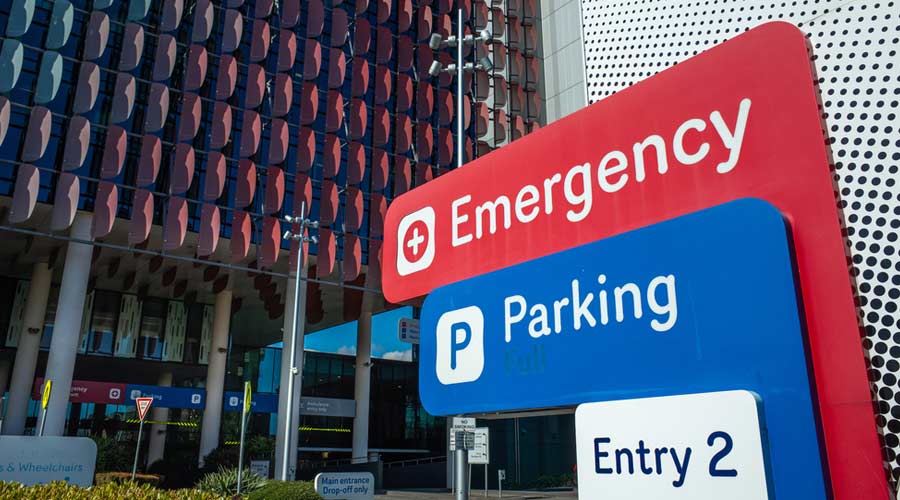Hospitals and other healthcare facilities were hit particularly hard by COVID-19. More than two years after the initial — and for healthcare organizations, most difficult — wave of the pandemic, hospitals across the United States have revised their facility management plans to ensure the safety of staff, patients and visitors. Hospital administrators know COVID-19 will not be the last deadly pandemic their organizations face, and they are putting the lessons they learned over the past few years to good use.
But do those new plans extend to parking areas? As with other common areas, parking facilities present challenges when it comes to protecting employees and visitors from COVID-19. Parking is an essential service that provides access to healthcare facilities for patients, doctors, nurses and staff.
In fact, parking is the first and last part of the healthcare experience for most patients, relatives and visitors, and it has a significant impact on that experience. For many hospitals, parking operations also produce revenue, so it is important not to treat parking as an afterthought when creating public health plans. Facility managers can take several critical steps that will make parking safer and protect hospital staff, patients and visitors.
Spotlight on sanitization
As with the rest of the hospital, sanitization is of paramount concern, particularly in common areas with doors, door handles, stairway handles, elevators and elevator lobbies.
Another area of parking where sanitization is essential but that is easily overlooked involves technology. People use parking entry and payment equipment all day long, so it is imperative to frequently clean their surfaces and, when possible, offer sanitary wipes so visitors can clean them off before using them. Parking equipment manufacturers offer touchless process options through motion-activated ticket dispensers, payment via parking apps, and scanned QR codes. Facilities should feature hand sanitizer stations adjacent to common touchpoints, such as elevator and stairwell landings and parking entry and exit machines.
Technology opportunities
As important as sanitization is, it is not enough. Managers also must consider other strategies, including process changes and the introduction of technology, which can minimize face-to-face interactions. Automation is the most important trend in parking right now, and parking technology can be a powerful tool for preventing the spread of COVID-19 and other viruses.
Several parking technologies can promote health and wellness, starting with payment equipment. By automating payment, removing cashiers at gates, and introducing pay-on-foot machines, managers can eliminate face-to-face interactions between staff and parkers, reducing the risk of viral transmission.
Frictionless parking systems using license plate recognition (LPR) technology can provide an entirely touchless experience. LPR equipment identifies vehicles licenses plates, and coupled with mobile payment, parkers can enter and exit without ever touching anything but their phone.
But LPR is not required for touch-free payment. Some access equipment provides bar codes upon entry. A driver takes a ticket and scans its bar code with a smartphone before the parking session ends, entering payment information. When leaving, the driver holds the smartphone or ticket to the reader and is automatically charged.
Similarly, parking pre-booking, where parkers reserve or prepay for a space, and mobile payment apps can promote public health by permitting drivers to reserve/pay with personal devices. If a hospital offers mobile payment or prebooking, now is the time to aggressively promote this amenity to increase adoption.
Management matters
In the emergency planning process, parking should always have a place at the table. As hospitals and other healthcare facilities plan for public health contingencies and circumstances, parking planners and administrators must be part of these discussions. Considering the number of people who use hospital parking facilities every day, it is critical for parking administrators to be part of the public health strategic planning.
Facility managers can promote public health through operational strategies. At the height of the pandemic, some hospitals turned to parking facilities to provide more tangible health benefits, including using parking facilities to provide drive-through, in-car COVID-19 testing. Spaces can be reallocated by assigning for clinical use manually with traffic cones, while garages with single-space guidance can reconfigure allocated spaces with a switch of a button.
Valet parking has always been an important offering, particularly for patients with limited mobility and accessibility issues. Many hospitals discontinued valet parking at the height of the crisis and now are having trouble finding staff to restart the service. Hospitals facing this staffing challenge might choose to implement reservation-based valet parking, which requires fewer staff, or keep valet parking closed until the pandemic is fully under control.
Patients and visitors make their initial contact with hospitals in their parking facilities. Facility managers can provide insight into the number of people visiting every day, particularly in automated facilities where equipment is constantly recording user data, and they know when people tend to arrive and the duration of their stays. They have access to unique, vital data that can help hospital leaders better manage their facilities. For these reasons, managers should consider adjusting current parking operations manuals to include emergency scenarios from a parking professional.
The last two years have been difficult, and for many in healthcare facilities, they have been frightening. As managers build strategies designed to protect patients, visitors and staff from COVID-19 and other public health threats, they need to remember to include parking experts in the planning.
Benjamin Sands is manager, parking planning and operations, with WGI. He is an experienced parking professional with broad experience in parking management, parking site feasibility, new structure design, as-built re-design, parking equipment/technology, commercial, hospital, university, hospitality, valet and event parking services, site underwriting, operations audits as well as general parking operations, logistics and management.
Jacob Gonzalez, P.E., is vice president of client solutions with WGI, a national design and professional services firm leading in technology-based solutions for the construction of public infrastructure and real estate development. He has more than 23 years of experience in parking planning, design, and consulting services and specializes in healthcare parking project management. He has worked on more than 60 healthcare projects across the country.

 Strategies to Eradicate Biofilm Containing C. Auris
Strategies to Eradicate Biofilm Containing C. Auris Man Attacks Nurses, Police Officer at Jefferson Hospital
Man Attacks Nurses, Police Officer at Jefferson Hospital Freeman Health System Breaks Ground on New Full-Service Hospital
Freeman Health System Breaks Ground on New Full-Service Hospital All Eyes on Gen Z as They Enter the Workforce
All Eyes on Gen Z as They Enter the Workforce Cleveland Clinic Starts Fundraising Effort for New Hospital in West Palm Beach
Cleveland Clinic Starts Fundraising Effort for New Hospital in West Palm Beach